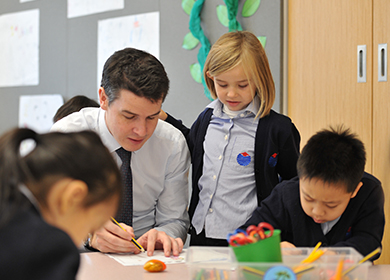Go Back
News
News
Transitioning Back to School
News
20 Mar, 2020
10 : 00
As life slowly seems to be getting back to normalcy and we begin to think (or dream) about the reopening of school, many of us may have a few questions; How will my child feel about going back to school? How do I help to ensure they are emotionally ready to handle a normal school routine? Rachel George,YCIS Beijing’s School Councilor, shares some strategies with parents on how they can help smoothen the transition from online learning to the classroom in the near future.
1. Check in with self.It is important to recognize that collectively we are all experiencing what experts call a traumatic event, one which threatens the safety of ourselves or those we care about. How our children experience such an event depends heavily on the emotional reactions of the supportive adults in their lives. It is important to check in with yourself and ask these questions: How am I feeling about the current world situation? Am I anxious or confident? How am I presenting these feelings to my children? Digging a little deeper into your own feelings and managing them before working with your child can help to ensure a more productive transition back to school.
2. Ask. Then Listen.Open the conversation by asking your child how they feel about school reopening try not to ask leading questions such as: Are you excited about school starting? Instead, you can say: Tell me your thoughts about school reopening. One activity is to use a list of emotions and ask them to choose the ones match how they are feeling. Do they choose words such as excited and happy, or do they choose anxious and scared? Whatever the choice, explore the feeling a little deeper and listen to any fears they may have
3. Honor their feelings.If your child is feeling anxious or fearful- it is OK. Validate their feelings by telling them you understand why they may feel that way. Remain calm and assure them that school is a safe place. After a traumatic event, children may lose a sense of security. They may become untrusting of the world around them. By assuring them that school is a safe place with caring adults, it may help to alleviate some anxiety.
4. Open the door for questions:Allow them time and space to ask questions- no question is too big or too small. Here’s a thought: turn an old tissue box into a worry box- where together as a family you can write down your worries. Once a week, you can choose a worry or question from the box and discuss. It may be helpful to draft a “worry action plan” where you can develop solutions. Not only does this help to build problem solving skills, but gives you insight into what your child may be thinking and not expressing
5. Pay attention to what they are not saying.Oftentimes, a child’s nonverbal cues can indicate they may be feeling anxious. Has there been a change in sleeping or eating patterns? Have they had more emotional outbursts lately? Do they seem withdrawn or more quiet than usual? These cues may indicate a need for a conversation.
6. Get back to “normal”In the weeks before school, begin transitioning back into your normal school routines, especially wake up times, and bed times. Review classroom routines and expectations. You can even reach out to tour child’s homeroom teacher for reminders. Help them to recreate the sense of familiarity so when the first day of school comes, they feel in control of their environment.
7. Shower them with loveYou may notice tour child becomes more clingy or hesitant to leave the family when school begins. This is normal. You are their sense of comfort and stability. During this time, praise them for their actions and take more time with routines. Let them know as always, you are here to support them and love them, no matter what. Add a love note to their backpack or lunch box the first week back, something they can refer back to during the day if they are feeling anxious. A little love goes a long way!
As always, Student Support is here to help you and your family navigate through the process. Please reach out to us via email. We are also available for a Zoom session if you would like assistance with transitioning. We are all in this together.












